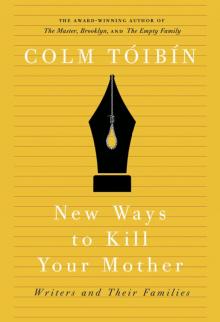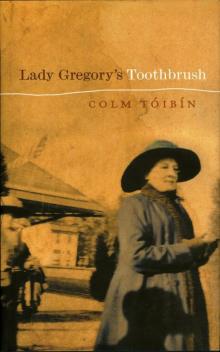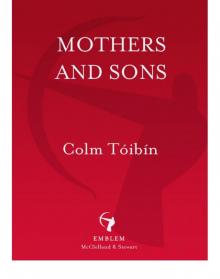- Home
- Colm Toibin
The Magician
The Magician Read online
Thank you for downloading this Simon & Schuster ebook.
Get a FREE ebook when you join our mailing list. Plus, get updates on new releases, deals, recommended reads, and more from Simon & Schuster. Click below to sign up and see terms and conditions.
CLICK HERE TO SIGN UP
Already a subscriber? Provide your email again so we can register this ebook and send you more of what you like to read. You will continue to receive exclusive offers in your inbox.
For Nan Graham
Chapter 1 Lübeck, 1891
His mother waited upstairs while the servants took coats and scarves and hats from the guests. Until everyone had been ushered into the drawing room, Julia Mann remained in her bedroom. Thomas and his older brother Heinrich and their sisters Lula and Carla watched from the first landing. Soon, they knew, their mother would appear. Heinrich had to warn Carla to be quiet or they would be told to go to bed and they would miss the moment. Their baby brother Viktor was sleeping in an upper room.
With her hair pinned back severely and tied in a colored bow, Julia stepped out from her bedroom. Her dress was white, and her black shoes, ordered specially from Majorca, were simple like a dancer’s shoes.
She joined the company with an air of reluctance, giving the impression that she had, just now, been alone with herself in a place more interesting than festive Lübeck.
On coming into the drawing room, having glanced around her, Julia would find among the guests one person, usually a man, someone unlikely such as Herr Kellinghusen, who was neither young nor old, or Franz Cadovius, his squint inherited from his mother, or Judge August Leverkühn, with his thin lips and clipped mustache, and this man would become the focus of her attention.
Her allure came from the atmosphere of foreignness and fragility that she exuded with such charm.
Yet there was kindness in her flashing eyes as she asked her guest about work and family and plans for the summer, and, speaking of the summer, she would wish to know about the relative comfort of various hotels in Travemünde, and then she would ask about grand hotels in places as distant as Trouville or Collioure or some resort on the Adriatic.
And soon she would pose an unsettling question. She would ask what her interlocutor thought about some normal and respectable woman within their group of associates. The suggestion was that this woman’s private life was a matter of some controversy and speculation among the burghers of the town. Young Frau Stavenhitter, or Frau Mackenthun, or old Fraulein Distelmann. Or someone even more obscure and retiring. And when her bewildered guest would point out that he had nothing other than good to say of the woman, in fact had nothing beyond the very ordinary to transmit, Thomas’s mother would express the view that the object of their discussion was, in her considered opinion, a marvelous person, simply delicious, and Lübeck was lucky to have such a woman among its citizens. She would say this as if it were a revelation, something that must stay quite confidential for the moment, something, indeed, that even her husband, the senator, had not yet been told.
The following day, news would spread about their mother’s deportment and whom she had singled out for comment, until Heinrich and Thomas would hear about it from their school friends, as if it were a very modern play, fresh from Hamburg, that had been performed.
In the evenings, if the senator were at a meeting, or in the time when Thomas and Heinrich, having done their violin practice and eaten their supper, were in their nightclothes, their mother would tell them about the country of her birth, Brazil, a place so vast, she said, that no one knew how many people were there or what they were like or what languages they spoke, a country many, many times the size of Germany, where there was no winter, and never any frost or real cold, and where one river, the Amazon, was more than ten times longer than the Rhine and ten times as wide, with many smaller rivers flowing into it that reached back deep into the forest, with trees higher than trees anywhere else in the world, with people whom no one had ever seen or would see, since they knew the forest as no one else did, and they could hide if an intruder or an outsider came.
“Tell us about the stars,” Heinrich would say.
“Our house in Paraty was on the water,” Julia would reply. “It was almost part of the water, like a boat. And when night came and we could see the stars, they were bright and low in the sky. Here in the north the stars are high and distant. In Brazil, they are visible like the sun during the day. They are small suns themselves, glittering and close to us, especially those of us who lived near water. My mother said you could sometimes read a book in the upstairs rooms at night because the light from the stars against the water was so clear. And you could not sleep unless you fastened the shutters to keep the brightness out. When I was a girl, the same age as your sisters, I really believed that all the world was like that. The shock on my first night in Lübeck was that I could not see the stars. They were covered over by clouds.”
“Tell us about the ship.”
“You must go to sleep.”
“Tell us the story of all the sugar.”
“Tommy, you know the story of the sugar.”
“But just a small part again?”
“Well, all the marzipan that is made in Lübeck uses sugar that comes from Brazil. Just as Lübeck is famous for marzipan, Brazil is famous for sugar. So when the good people of Lübeck and their children eat their marzipan on Christmas Eve, little do they know that they are eating a part of Brazil. They are eating sugar that came across the sea just for them.”
“Why don’t we make our own sugar?”
“You must ask your father that.”
Years later, Thomas wondered if his father’s decision to marry Julia da Silva-Bruhns, whose mother was reputed to have had in her veins blood from South American Indians, rather than a stolid daughter of one of the local shipping magnates or old trading and banking families, was not the beginning of the decline of the Manns, evidence that a hunger for the richly strange had entered the spirit of the family, which had, up to then, possessed an appetite only for what was upright and certain to yield a steady return.
In Lübeck, Julia was remembered as a small girl arriving with her sister and her three brothers after their mother had died. They were taken care of by an uncle, and they did not, when they appeared first in the city, have a word of German. They were watched suspiciously by figures such as old Frau Overbeck, known for her staunch adherence to the practices of the Reformed Church.
“I saw those children blessing themselves one day as they passed the Marienkirche,” she said. “It may be necessary to trade with Brazil, but I know no precedent for a Lübeck burgher marrying a Brazilian, none at all.”
Julia, only seventeen at the time of her marriage, gave birth to five children who carried themselves with all the dignity required of the children of the senator, but with an added pride and self-consciousness, and something close to display, which Lübeck had not seen before and which Frau Overbeck and her circle hoped would not become fashionable.
Due to this decision to marry unusually, the senator, eleven years older than his wife, was viewed with a certain awe, as though he had invested in Italian paintings or rare majolica, acquired to satisfy a taste that, up to then, the senator and his antecedents had kept in check.
Before leaving for church on Sunday, the Mann children had to be carefully examined by their father while their mother delayed them by remaining upstairs in her dressing room, trying on hats or changing her shoes. Heinrich and Thomas had to show a good example by maintaining an expression of gravity, while Lula and Carla tried to stand still.
By the time Viktor was born, Julia was less attentive to the strictures that her husband laid down. She liked the girls to have colorful bows and stockings, and she did not object to the boys having lo
nger hair and greater latitude in their comportment.
Julia dressed elegantly for church, often wearing only one color—a gray, for example, or a dark blue, with matching stockings and shoes and the only sign of relief a red or yellow band on her hat. Her husband was known for the precision of the cuts made by his tailor in Hamburg and for his impeccable appearance. The senator changed his shirt every day, sometimes twice a day, and had an extensive wardrobe. His mustache was trimmed in the French manner. In his fastidiousness, he represented the family firm in all its solidity, a century of civic excellence, but in the luxury of his wardrobe he offered his own view that being a Mann in Lübeck meant more than money or trade, it suggested not only sobriety but a considered sense of style.
To his horror, on the short journey between the Manns’ house on Beckergrube and the Marienkirche, Julia often greeted people, gleefully and freely calling out their names, something that had never been done before on a Sunday in the history of Lübeck, further convincing Frau Overbeck and her spinster daughter that Frau Mann was, in her heart at least, still a Catholic.
“She is showy and silly, and that is the mark of a Catholic,” Frau Overbeck said. “And that band on her hat is pure frivolity.”
In the Marienkirche itself as the wider family assembled, it was noted how pale Julia was, and how oddly alluring her pallor was against her heavy chestnut hair and mysterious eyes, which rested on the preacher in an expression of half-veiled mockery, a mockery that was alien to the seriousness with which her husband’s family and their friends treated religious observance.
* * *
Thomas realized that his father disliked hearing about his wife’s childhood in Brazil, especially if the girls were present. His father, however, loved when Thomas asked him to talk about old Lübeck and to explain how the family firm had grown from modest beginnings in Rostock. His father appeared to derive satisfaction when Thomas, calling at his office on his way home from school, sat and listened about ships and warehouses and banking partners and insurance schemes, and then later remembered what he had been told.
Even distant cousins came to believe that while Heinrich was dreamy and rebellious like his mother and was to be found reading books, young Thomas, alert and grave in his demeanor, was the one who would take the family firm into the next century.
As the girls grew older, all the children would gather in their mother’s dressing room if their father had left for his club or for some meeting, and Julia would resume her stories about Brazil, telling of the whiteness of the clothes the people wore there, the amount of washing that was done so that everyone looked special and beautiful, the men as well as the women, the black people as well as the white.
“It was not like Lübeck,” she said. “No one saw any need to be solemn. There were no Frau Overbecks pursing their lips. No families like the Esskuchens in perpetual mourning. In Paraty, if you saw three people, then one was talking and the other two were laughing. And they were all in white.”
“Were they laughing at a joke?” Heinrich asked.
“Just laughing. That is what they did.”
“But laughing at what?”
“Darling, I don’t know. But that is what they did. Sometimes at night I can hear that laughter still. It comes in on the wind.”
“Can we go to Brazil?” Lula asked.
“I don’t think your father wants you to go to Brazil,” Julia said.
“But when we are older?” Heinrich asked.
“We can never tell what will happen when we are older,” she said. “Perhaps you will be able to go anywhere then. Anywhere!”
“I would like to stay in Lübeck,” Thomas said.
“Your father will be happy to hear that,” Julia replied.
* * *
Thomas lived in a world of his dreams more than his brother Heinrich did, or his mother, or his sisters. Even his discussions with his father about warehouses were further aspects of a fantasy world that often included himself as a Greek god, or as a figure in a story from a nursery rhyme, or the woman in the oil painting that his father had placed on the stairwell, the expression on her face ardent, anxious, expectant. He was not sure sometimes that he was not, in reality, older than Heinrich and stronger, or that he did not go out each day with his father as an equal to the office, or that he was not Matilde, his mother’s maid in charge of the dressing room, who took care that his mother’s shoes were kept in pairs and that her bottles of perfume were never empty and that her secret things remained in the correct drawers away from his prying eyes.
When he heard them say that he was the one who would shine in the world of business, when he impressed visitors by knowing about consignments due to arrive, and the names of ships and faraway ports, he almost shuddered at the thought that if these people knew who he really was, they would take a different view of him. If they could actually see into his mind and know how much at night and even in the day he allowed himself to become the woman in the painting on the stairwell with all her fervid desires, or someone who moved across the landscape with a sword or with a song, then they would shake their heads in wonder at how cleverly he had fooled them, how cunningly he had won his father’s approval, what an imposter and confidence man he was, and how little he could be trusted.
Heinrich, of course, knew who he was, and was aware enough of his younger brother’s dream life to realize not only that it exceeded his own in scope and scale, but that, as he warned him, the more Thomas extended his ability to dissimulate, the greater the danger of being found out. Heinrich, unlike his brother, made himself clear to the household. His fascination, as he grew into his teens, with Heine and Goethe, with Bourget and Maupassant, was as transparent as his indifference to ships and warehouses. He saw these latter things as dull, and no amount of admonishment could prevent him from emphasizing to his father that he wanted nothing whatsoever to do with the family business.
“I saw you over lunch doing an imitation of a little businessman,” he said to Thomas. “Everyone was fooled except me. When are you going to let them know that you are only pretending?”
“I am not pretending.”
“You don’t mean a word of it.”
Heinrich had developed a way of disassociating himself so completely from the family’s main concerns that his father learned to leave him alone, concentrating instead on correcting small failures in the manners or bearing of his second son and his two daughters. Julia tried to interest Heinrich in music, but he did not want to go on playing the piano or the violin.
Heinrich would, Thomas thought, have become totally detached from the family had it not been for his intense devotion to his sister Carla. There were ten years between the two, so that Heinrich’s response to his sister was more fatherly than brotherly. From the time she was a baby, Heinrich carried Carla about the house. And then, as she got older, he taught her card games and played a gentle version of hide-and-seek in which only they were involved.
His affection for Carla allowed others to admire the softness in him, the consideration. Even though he had friends and manly activities to attend to, Heinrich would react to Carla’s demands with tenderness. If Lula became jealous of the attention paid to her sister, Heinrich would include her too, but she often grew bored as her sister and her older brother appeared to have a private way of communicating with and amusing each other.
“Heinrich is very kind,” a cousin said. “If only he were practical as well, then the family’s future would be secure.”
“There is always Tommy,” Aunt Elisabeth said, turning to Thomas. “Tommy is going to take the firm into the twentieth century. Is that not your plan?”
Thomas would smile as best he could, having noted the faint irony in her tone.
Even though it was believed that his recalcitrance came from her side of the family, Heinrich, as he grew older, began to be bored by his mother’s stories, nor did he seem to have inherited her fragility of spirit, her engagement with the rare, the exquisite. Strangely, for all his
talk about poems and art and travel, Heinrich, in his air of frankness and determination, was, despite himself, becoming a pure, genuine Mann. Indeed, when he was seen walking through Lübeck, his aunt Elisabeth loved to remark how much he resembled his grandfather Johann Siegmund Mann, how he had the heavy gait that she associated with old Lübeck, and also the ponderous tone of his father’s line. It was such a pity that he lacked any enthusiasm for trade.
It was clear to Thomas that the business would, in time, be left to him to manage rather than to his older brother, that the house that had been his grandparents’ would eventually be his domain. He could fill it with books, he thought. He saw how he would reconfigure the upstairs rooms and move the offices to some other building. He would order books from Hamburg, as his father ordered his clothes, and from farther afield, perhaps even from France if he could learn to read French, or from London when his English was more fluent. He would live in Lübeck as no one had ever done, with a business that he would have consolidated, enough for it to be merely a way to fund his other concerns. He would like a French wife, he thought. She would add luster to their lives.
He imagined his mother coming to visit the house on Mengstrasse, when he and his wife would have decorated it, and admiring what they had done, the new piano they had bought, the paintings from Paris, the French furniture.
As Heinrich grew taller, he came to let Thomas know more emphatically that his younger brother’s efforts to behave like a Mann were still a pose, a pose whose falsity was increasingly apparent when Thomas began to read more poetry, when he could no longer keep his enthusiasm for culture a secret, and when he would fitfully allow his mother to accompany him on the Bechstein in the drawing room as he played the violin.
Time passed and Thomas’s efforts to pretend that he was interested in ships and trade gradually crumbled. While Heinrich had grown defiantly unequivocal in his ambitions, Thomas was nervous and evasive, but still he could not disguise how he had changed.

 The Magician
The Magician The Empty Family (v5)
The Empty Family (v5) New Ways to Kill Your Mother
New Ways to Kill Your Mother The Master
The Master The Heather Blazing
The Heather Blazing Brooklyn
Brooklyn The Blackwater Lightship
The Blackwater Lightship The South
The South Lady Gregory's Toothbrush
Lady Gregory's Toothbrush House of Names
House of Names Mothers and Sons
Mothers and Sons Synge
Synge The Modern Library
The Modern Library The Testament of Mary
The Testament of Mary Mad, Bad, Dangerous to Know
Mad, Bad, Dangerous to Know Nora Webster: A Novel
Nora Webster: A Novel